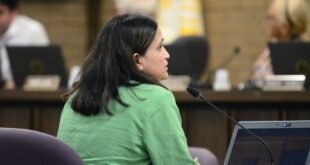
The Franklin Public Library Board of Trustees should heed suggestions on its proposed southern branch made by the township Environmental Commission and planning department officials, the Planning Board recommended at its August 18 meeting.
The Board passed on its recommendations over the objections of a handful of residents who live near the Franklin Park site of the proposed library extension.
The residents, most of whom lived adjacent to the 2-acre plot targeted for the library branch, urged the Board to postpone its recommendations on the project until after the Covid-19 pandemic is over, and a full traffic study could be completed.
The Board was presented the plan by the library trustees for a courtesy review, as is the procedure when a public agency undertakes a development project. Under state law, the Board has no authority to approve or reject the plan.
The library trustees want to build a 5,580-square-foot library branch on a 2.3-acre plot near the Franklin Park School.
The branch would replace one currently housed in space at the Franklin Towne Center, at the corner of South Middlebush Road and State Route 27.
The fact that the Board had no authority to compel the library trustees to do anything frustrated the objectors, who argued that a traffic study contracted by the library trustees was lacking data, and in light of that, the Board should postpone making any recommendations until after the Covid-19 pandemic has ended and a full traffic study could be conducted.
But that argument didn’t fly with Board members, including Board chairman Michael Orsini.
Orsini noted that the library trustees’ traffic expert, Harold Maltz, admitted that because the pandemic had interrupted school attendance, he could get an accurate traffic count along Baylor Street, which is used by cars and buses heading to Franklin Park School.
Instead, Maltz spoke to school officials about the amount of traffic in and out of the school during the mornings and afternoons.
Maltz then used statistics compiled by the Institute of Traffic Engineers trip generation manual to estimate the number of car trips in and out of teh library site.
He said his estimates showed that traffic volume created by the library branch would be “very, very light” and would have no effect on Baylor.
“It’s not like somebody’s putting a supermarket in there, ” he said.
Maltz also noted that the library will not open before 10 a.m., after students are in school, and will close after the students have left. The library will also be closed on Sundays.
Orsini said that Maltz “went above and beyond what he minimally had to do … and based his report on that with the full transparency that he couldn’t put a line in the street and do a traffic count. He went out and found out what the pre-pandemic school use was, and that’s principally what’s generating traffic in this area.”
One resident, Veronica Avenir, insisted that the Board should postpone any action until a full traffic study could be conducted.
“Does it not make sense to postpone this decision until an accurate traffic count can be done?” she asked. “As residents, are we not due that, that we have accurate data?”
Board attorney Peter Vignuolo said that the Board didn’t have the discretion to put off any action on the plan.
“We’re having a discussion about something that can’t occur,” he said.
Earlier in the meeting, Avenir asked the plan’s project manager, Jeff Reynolds, why the area had to be cleared of its brush and trees.
“Why do you need to level everything and disregard the need for habitat for existing wildlife?” she asked. “Why? Because it’s pretty? Or because you make more money.”
Reynolds had earlier testified that the ground covering consisted mainly of “thicket,” and that the plan “would replace that thicket very nicely with a beautiful new library.”
“There’s nothing worthwhile on that site worth saving,” he said.
Board member Bob Thomas agreed.
“Using the existing vegetation would be a huge mistake,” he said. “This property isn’t big enough or deep enough. What’s proposed is far superior to what’s there.”
In making its recommendations, the Board suggested that a wish list for the project compiled by the township’s Environmental Commission be honored.
That list included solar panels on the library’s roof, charging stations for electric cars, a bike rack and LED lighting.
The Board also recommended that any suggestions made by township planning staff be fulfilled.
Another recommendation, first made by Ted Chase, the Township Council liaison to the Board, but not binding on the library trustees, was that a sidewalk be constructed out to Claremont Road.
Thomas said that would be a good use for the township’s sidewalk fund, which was created by payments made by developers in lieu of providing sidewalks in their projects.
Franklin Park resident Christopher Brosius lambasted the Board over the project.
“I don’t know why we’re doing this boondoggle,” he said “You’re knocking down the woods, destroying the wildlife habitat. This is a big waste of taxpayer’s money, at a time when you can’t waste taxpayer’s money.”
 The Franklin Reporter & Advocate Eight Villages, One Community
The Franklin Reporter & Advocate Eight Villages, One Community

